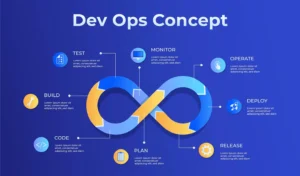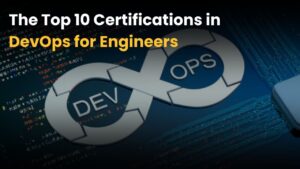As the technological landscape evolves, the role of DevOps professionals continues to grow in importance. By 2025, organizations across industries will rely even more heavily on DevOps engineers to drive agility, efficiency, and innovation. Staying competitive requires a strong awareness of evolving tools, processes, and industry trends. Here are the key skills DevOps professionals need to master for success in 2025.
1. Cloud-Native Development and Multi-Cloud Expertise
Cloud platforms are foundational to DevOps, and by 2025, multi-cloud strategies will dominate. Hybrid and multi-cloud systems will be used by businesses more and more in order to save expenses and prevent vendor lock-in.
Key Skills:
Proficiency in AWS, Microsoft Azure, and Google Cloud Platform (GCP): DevOps professionals must have hands-on experience with at least two major cloud providers.
- Kubernetes and Container Orchestration: Expertise in Kubernetes, Docker, and related tools is essential for managing scalable, containerized applications.
- Serverless Architectures: Understanding serverless services like AWS Lambda or Azure Functions will be crucial for reducing infrastructure management overhead.
Actionable Tips:
Obtain qualifications such as AWS Certified DevOps Engineer or Google Cloud Professional DevOps Engineer. Gain experience deploying applications across multiple cloud platforms.
To become a Expert in Devops check DevOps Training in Pune Course.
2. Infrastructure as Code (IaC) Mastery
IaC, or infrastructure as code, is now the foundation of contemporary DevOps. By 2025, professionals must be adept at automating infrastructure provisioning and management.
Key Skills:
Terraform and AWS CloudFormation: These are critical tools for defining and deploying infrastructure.
- Ansible, Puppet, and Chef: Knowledge of configuration management tools will remain relevant.
- Policy as Code: Skills in automating compliance checks using tools like HashiCorp Sentinel will be increasingly valuable.
Actionable Tips:
Create reusable Terraform modules for common infrastructure patterns.
Implement policy-as-code solutions to ensure security compliance.
3. Security as a Core Discipline (DevSecOps)
Security will no longer be a separate concern but an integral part of the development and deployment pipeline. DevOps pros must embrace a DevSecOps mindset.
Key Skills:
Security Automation: Familiarity with tools like OWASP ZAP and Snyk for continuous vulnerability scanning.
- Identity and Access Management (IAM): Excellent understanding of cloud platform IAM best practices.
- Shift-Left Security: The ability to incorporate security checks early in the development cycle is known as shift-left security.
Actionable Tips:
Automate CI/CD pipeline security testing.
Learn to conduct threat modeling and secure coding practices.
4. Continuous Integration and Continuous Delivery (CI/CD) Expertise
CI/CD pipelines are the lifeblood of DevOps, enabling fast and reliable software delivery. By 2025, automation and observability within CI/CD will be more advanced.
Key Skills:
Jenkins, GitLab CI, and GitHub Actions: Experience with major CI/CD tools.
- GitOps: Mastering GitOps practices using tools like ArgoCD and Flux.
- Automated Testing: Proficiency in developing strong test suites for performance, integration, and unit testing.
Actionable Tips:
Design CI/CD workflows that include automated rollbacks.
Implement canary deployments and blue-green deployment strategies.
5. AI and Machine Learning Integration
Machine learning and artificial intelligence (AI/ML) are increasingly being included into DevOps procedures. By 2025, these technologies will enhance predictive analytics and automation.
Key Skills:
- AI for Monitoring and Alerting: Use machine learning tools to identify anomalies and forecast failures.
- AI-Powered Testing: Make use of AI for automated test case generation and defect detection.
- Automated Remediation: Put in place self-healing systems that react to incidents without the need for human intervention.
Actionable Tips:
Explore platforms like AIOps for integrating AI into operations.
Learn to configure and fine-tune ML models for DevOps tasks.
6. Observability and Monitoring
Traditional monitoring will no longer suffice. Observability— the ability to measure the internal states of systems based on outputs—will be a critical skill.
Key Skills:
Prometheus, Grafana, and ELK Stack: Experience with modern observability tools.
- Distributed Tracing: Skills in implementing tracing with Open Telemetry or Jaeger.
- Logging and Metrics Management: Expertise in managing large-scale logging infrastructure.
Actionable Tips:
Implement distributed tracing to diagnose microservices issues.
Dashboards may be used to give real-time information on the health of the system.
7. Soft Skills for Collaboration and Problem Solving
DevOps is as much about culture as it is about technology, and its foundations include cooperation, communication, and continuous improvement.
Key Skills:
- Cross-Functional Communication: The capacity to bridge the gap between development, operations, and business teams.
- Agile and Lean Practices: Familiarity with methodologies like Scrum and Kanban.
- Problem-solving and Innovation: Proactively recognizing and resolving technological issues is known as problem-solving and innovation.
Actionable Tips:
Participate in cross-functional teams to enhance collaborative skills.
Regularly review and improve team workflows.
8. Edge Computing and IoT
By 2025, edge computing and IoT (Internet of Things) will be crucial for many industries. DevOps professionals must understand how to deploy and manage distributed systems.
Key Skills:
- Edge Orchestration: Knowledge of tools like KubeEdge or AWS IoT Greengrass.
- Data Processing at the Edge: Skills in handling data streaming and analytics on edge devices.
- Proactively recognizing and resolving technological issues is known as problem-solving and innovation.
Actionable Tips:
Practice deploying microservices on edge devices.
Explore use cases in industries like automotive, healthcare, and smart cities.
Important Soft Skills for DevOps Engineers
In the fast-paced world of DevOps, technical expertise is a necessity, but success also heavily depends on various soft skills. These skills bridge the gap between teams, enhance collaboration, and drive efficiency across the software development lifecycle. The most crucial soft skills that DevOps engineers should have are listed below.
1. Collaboration and Teamwork
Successful DevOps engineers frequently operate at the nexus between operations and development teams. DevOps culture thrives on collaboration, requiring engineers to communicate effectively with developers, testers, system administrators, and business stakeholders. The ability to foster a collaborative environment ensures smooth integration of code, continuous delivery, and faster resolution of issues.
Key Traits:
- Open-mindedness to new ideas
- Willingness to share knowledge
- Active participation in team discussions
2. Communication Skills
Effective communication is a cornerstone of any DevOps role. Engineers must be able to articulate technical concepts to non-technical team members, document processes clearly, and keep all stakeholders informed about project progress, challenges, and solutions.
Key Traits:
- Clear and concise writing for documentation
- Active listening
- Presentation skills
3. Problem-solving and Critical Thinking
DevOps engineers are constantly addressing issues related to system performance, deployment processes, and automation. Strong problem-solving abilities aid in discovering fundamental issues, implementing efficient remedies, and maintaining high system reliability.
Key Traits:
- Analytical mindset
- Creativity in finding solutions
- Ability to think under pressure
4. Adaptability and Flexibility
The technology landscape changes rapidly, and DevOps engineers must stay ahead of new tools, methodologies, and best practices. Adaptability allows them to embrace changes in technology stacks and organizational processes without losing momentum.
Key Traits:
- Willingness to learn new technologies
- Ability to pivot strategies when necessary
5. Empathy and Emotional Intelligence
Fostering a healthy DevOps culture requires an understanding of other people’s viewpoints and difficulties. Empathy helps engineers build trust with teammates and collaborate more effectively by considering the human aspect of technological decisions.
Key Traits:
- Active listening to concerns
- Offering constructive feedback
- Managing disagreements diplomatically
6. Time Management and Prioritization
DevOps engineers juggle multiple tasks, from infrastructure management to automation scripting and incident response. Time management ensures deadlines are met without compromising on quality or performance.
Key Traits:
- Prioritizing tasks based on impact
- Efficient scheduling and resource allocation
- Ability to focus amidst interruptions
7. Leadership and Mentorship
Even without formal leadership roles, DevOps engineers often guide teams in adopting best practices and new tools. Leadership involves setting examples, driving initiatives, and mentoring less experienced colleagues.
Key Traits:
- Leading by example
- Encouraging continuous improvement
- Providing mentorship and technical guidance
Conclusion
The DevOps landscape is continuously evolving, and success in 2025 will depend on a combination of technical expertise, automation, security awareness, and adaptability. DevOps experts may establish themselves as invaluable resources to their companies and spur innovation in the rapidly evolving technology sector by being proficient in these areas.
For DevOps engineers, technical proficiency is essential, but soft skills are just as important. Mastering collaboration, communication, problem-solving, adaptability, and emotional intelligence will enhance an engineer’s effectiveness and contribute significantly to the success of DevOps initiatives. The secret to succeeding in this fast-paced industry is a well-balanced mix of soft skills and technical expertise. Check out the DevOps Training in Pune course to become an expert in DevOps.







